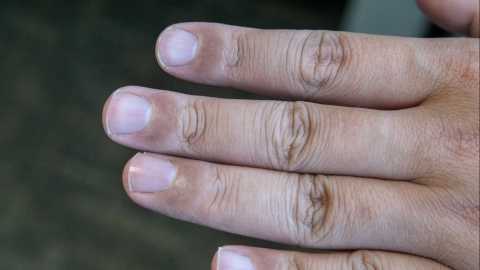What causes stiffness in the middle finger joint upon waking in the morning?
Generally, difficulty in bending the middle finger joint in the morning may be caused by nighttime postural pressure, temporary joint stiffness, rheumatoid arthritis, tenosynovitis, or osteoarthritis. It is recommended to seek medical attention promptly, identify the underlying cause, and receive symptomatic treatment under a doctor's guidance. Specific analyses are as follows:

1. Nighttime postural pressure: Prolonged compression of the middle finger during sleep can impair local blood circulation and nerve conduction, leading to limited bending upon waking. After waking, gently move the middle finger by performing slow flexion and extension exercises, or lightly massage around the joint to promote blood circulation and relieve discomfort.
2. Temporary joint stiffness: Reduced joint movement at night slows the flow of synovial fluid, making it easy to experience brief stiffness and limited bending upon waking. No special treatment is required; simply perform appropriate finger joint activities after rising each morning—such as clenching fists and stretching fingers. Symptoms typically improve gradually with consistent practice over time.
3. Rheumatoid arthritis: An autoimmune disorder that triggers joint inflammation, causing morning stiffness and difficulty bending the middle finger joint, often accompanied by swelling and pain. Patients may follow medical advice to take medications such as methotrexate tablets, leflunomide tablets, or sulfasalazine enteric-coated tablets to control inflammation and alleviate symptoms.
4. Tenosynovitis: Repetitive finger movements over time cause friction and inflammation between tendons and tendon sheaths, resulting in restricted bending of the middle finger upon waking, sometimes accompanied by snapping sounds. Under medical guidance, patients may use medications like diclofenac diethylamine gel, ibuprofen sustained-release capsules, or naproxen tablets to relieve pain, or undergo local corticosteroid injections.
5. Osteoarthritis: Inflammation caused by degeneration and wear of joint cartilage leads to morning stiffness and limited bending of the middle finger joint, with slight relief after activity. In severe cases, arthroscopic debridement surgery may be necessary to remove proliferative tissue within the joint, improve joint mobility, and reduce discomfort.
In daily life, avoid prolonged repetitive use of the middle finger to minimize joint strain. After manual work, soak fingers in warm water to relax joints and muscles, and perform appropriate finger stretching exercises to enhance joint flexibility and reduce the likelihood of morning bending difficulties.




